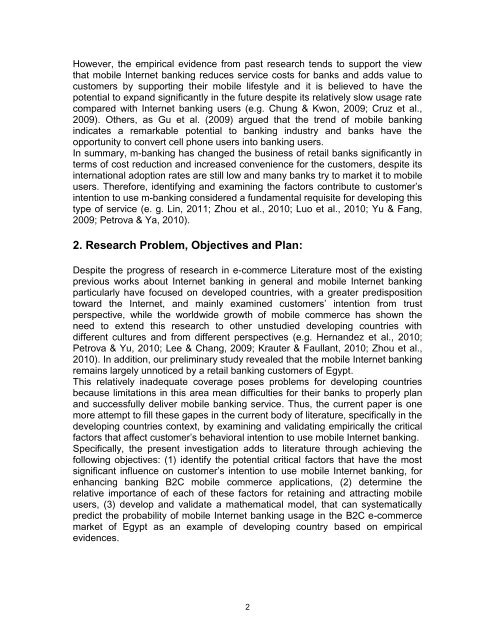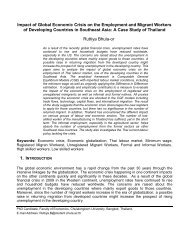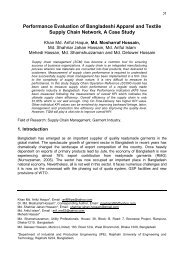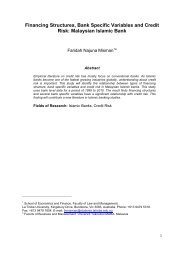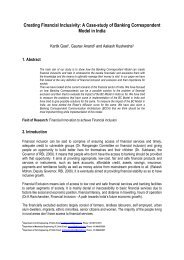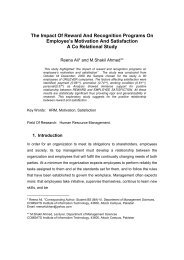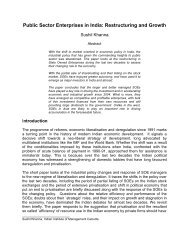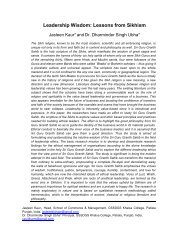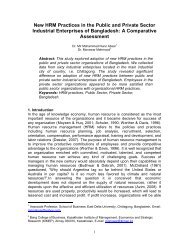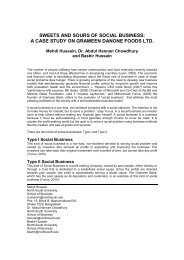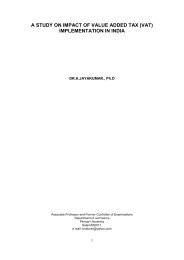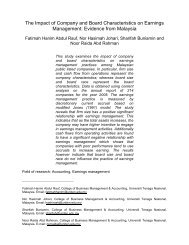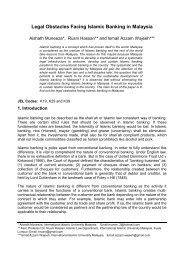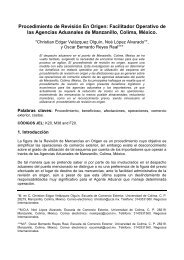An empirical examination of behavioral intention to mobile Internet ...
An empirical examination of behavioral intention to mobile Internet ...
An empirical examination of behavioral intention to mobile Internet ...
Create successful ePaper yourself
Turn your PDF publications into a flip-book with our unique Google optimized e-Paper software.
However, the <strong>empirical</strong> evidence from past research tends <strong>to</strong> support the viewthat <strong>mobile</strong> <strong>Internet</strong> banking reduces service costs for banks and adds value <strong>to</strong>cus<strong>to</strong>mers by supporting their <strong>mobile</strong> lifestyle and it is believed <strong>to</strong> have thepotential <strong>to</strong> expand significantly in the future despite its relatively slow usage ratecompared with <strong>Internet</strong> banking users (e.g. Chung & Kwon, 2009; Cruz et al.,2009). Others, as Gu et al. (2009) argued that the trend <strong>of</strong> <strong>mobile</strong> bankingindicates a remarkable potential <strong>to</strong> banking industry and banks have theopportunity <strong>to</strong> convert cell phone users in<strong>to</strong> banking users.In summary, m-banking has changed the business <strong>of</strong> retail banks significantly interms <strong>of</strong> cost reduction and increased convenience for the cus<strong>to</strong>mers, despite itsinternational adoption rates are still low and many banks try <strong>to</strong> market it <strong>to</strong> <strong>mobile</strong>users. Therefore, identifying and examining the fac<strong>to</strong>rs contribute <strong>to</strong> cus<strong>to</strong>mer’s<strong>intention</strong> <strong>to</strong> use m-banking considered a fundamental requisite for developing thistype <strong>of</strong> service (e. g. Lin, 2011; Zhou et al., 2010; Luo et al., 2010; Yu & Fang,2009; Petrova & Ya, 2010).2. Research Problem, Objectives and Plan:Despite the progress <strong>of</strong> research in e-commerce Literature most <strong>of</strong> the existingprevious works about <strong>Internet</strong> banking in general and <strong>mobile</strong> <strong>Internet</strong> bankingparticularly have focused on developed countries, with a greater predisposition<strong>to</strong>ward the <strong>Internet</strong>, and mainly examined cus<strong>to</strong>mers’ <strong>intention</strong> from trustperspective, while the worldwide growth <strong>of</strong> <strong>mobile</strong> commerce has shown theneed <strong>to</strong> extend this research <strong>to</strong> other unstudied developing countries withdifferent cultures and from different perspectives (e.g. Hernandez et al., 2010;Petrova & Yu, 2010; Lee & Chang, 2009; Krauter & Faullant, 2010; Zhou et al.,2010). In addition, our preliminary study revealed that the <strong>mobile</strong> <strong>Internet</strong> bankingremains largely unnoticed by a retail banking cus<strong>to</strong>mers <strong>of</strong> Egypt.This relatively inadequate coverage poses problems for developing countriesbecause limitations in this area mean difficulties for their banks <strong>to</strong> properly planand successfully deliver <strong>mobile</strong> banking service. Thus, the current paper is onemore attempt <strong>to</strong> fill these gapes in the current body <strong>of</strong> literature, specifically in thedeveloping countries context, by examining and validating <strong>empirical</strong>ly the criticalfac<strong>to</strong>rs that affect cus<strong>to</strong>mer’s <strong>behavioral</strong> <strong>intention</strong> <strong>to</strong> use <strong>mobile</strong> <strong>Internet</strong> banking.Specifically, the present investigation adds <strong>to</strong> literature through achieving thefollowing objectives: (1) identify the potential critical fac<strong>to</strong>rs that have the mostsignificant influence on cus<strong>to</strong>mer’s <strong>intention</strong> <strong>to</strong> use <strong>mobile</strong> <strong>Internet</strong> banking, forenhancing banking B2C <strong>mobile</strong> commerce applications, (2) determine therelative importance <strong>of</strong> each <strong>of</strong> these fac<strong>to</strong>rs for retaining and attracting <strong>mobile</strong>users, (3) develop and validate a mathematical model, that can systematicallypredict the probability <strong>of</strong> <strong>mobile</strong> <strong>Internet</strong> banking usage in the B2C e-commercemarket <strong>of</strong> Egypt as an example <strong>of</strong> developing country based on <strong>empirical</strong>evidences.2


